- Home
- Jamie Fredric
Silent Vengeance Page 5
Silent Vengeance Read online
Page 5
The guards stepped carefully on dead leaves, ferns, palm fronds, as they wove their way in and out of thick vegetation on the hillside, seventy feet above the creek and shacks. A steady rain two hours earlier left the ground underneath slippery and muddied.
A sound of an aircraft brought them to a standstill, as they looked overhead, and aimed their weapons at the oncoming plane. Flying less than 100 feet above the trees, the dark gray plane was making its final approach. The guards recognized it, but continued watching until it disappeared over the trees. One of the guards signaled the men below with two short whistles. They'd expect the pilot to show up within 45 minutes.
The plane, an O-2A Skymaster, known as "Oscar Deuce," was the military version of a Cessna 337. During the Vietnam War the Skymaster served as a FAC (forward air control) aircraft, ensuring the safety of friendly troops on the ground. It also maintained a night mission role. A low-cost, twin-engine piston-powered aircraft, it had a single engine in the nose and one in the rear of the fuselage. Under each wing was a 7.62mm mini-gun, using 7.62mm NATO ammo, and could fire up to 4,000 rounds per minute without overheating.
The plane was one of many aircraft turned over to the Vietnamese after the war, then wound up for sale on the black market. Mini-guns were removed, and sold separately. Sales were brisk, especially since the price was cheap, and almost anyone could fly it after a few lessons.
*
An old dirt road, cut through the forest by the Japanese during World War II, had taken direct hits from American bombs, obliterating a two-mile stretch. Years later, a small creek branched off from where the shacks were built, making transportation by boat convenient.
The untouched road had recently been converted to a makeshift runway. But touchdown was critical before passing a stand of bamboo; otherwise, a nosedive into the creek was possible.
Mitch Banyon lined up the Skymaster, adjusted flaps, corrected airspeed. With only a few feet from touchdown, he powered back and leveled off. Tires hit dirt, splashed through puddles. He stomped on the brakes, struggling to bring the aircraft to a stop. Every landing made his palms sweat, and this one was no exception. With 50 yards to spare, he turned the plane, readying it for his next departure.
Once he finished the checklist, he surveyed the perimeter. Except for forest creatures scurrying about, and birds settling again on perches, the area was clear. He slid the .38 from his shoulder holster, checked the cylinder, then shoved the weapon back in. He glanced over his shoulder. Since he'd removed the rear passenger seats, storage capacity had doubled.
He put on his drab green cap, grabbed his canteen, then scooted across the right seat and got out. Hooking the canteen on his belt, he scanned the area one last time, listening for any sounds not typical for the rainforest. Feeling it was safe, he began his usual quarter mile trek along a path that had nearly been wiped out by heavy rains, but he was still making good time. His delivery had gone off without a hitch, and his turnaround time was quicker than expected. But the long flight was never one he looked forward to.
He trudged through the forest, pushing aside small branches dangling across the path. Large rain droplets slid off palm leaves, splashing on his cap. His short-sleeve, green T-shirt didn't give his arms much protection from sharp brush and insects, but his summer-weight camies and ankle-high boots protected his body and legs.
This place is as miserable as that shithole, Vietnam, he thought disgustedly. Tree canopies were so tall and thick they could wipe out all forms of light. Pungent smells from rotting vegetation and dead animals permeated the air. He no longer worried about booby traps, only 18' pythons falling from trees, or Russel's vipers, or Asiatic king cobras, two of the deadliest snakes in the world.
Mitch Banyon, former U.S. Army sergeant, officially listed as M.I.A. Mitch Banyon -- deserter. During his second tour in Vietnam, and after being in-country three months, he went on R&R to Bangkok, staying at the Windsor Hotel. Massage parlors and escort services were plentiful in the city. After an evening with an escort, Banyon decided to walk away from the Army, wiping out his previous life.
Once his decision to desert had been made, his immediate concern was to distance himself from Bangkok. At nearly 6' tall, he stood out among the residents of the city. A tattoo on his left upper arm -- crossed rifles intertwined with a rattlesnake -- was easy for someone to identify. He opted to let his straight, light brown hair grow, now hanging halfway to his shoulders.
The quickest, easiest destination for him was Burma, where he could "get lost" with little effort. Burma. Where he discovered a drug called yaba, not to use, but to sell. In the beginning, selling yaba enabled him to barely eke out an existence. Then an opportunity came out of nowhere.
He'd been living in a hut along the Southwest Coast, just outside the town of Kampong Tengah. His supplier would drop off one carton of yaba twice a month, with each carton holding 200 of the 6mm pills. Who he sold them to, the price and quantity, was left entirely up to him.
Four months earlier he was approached by someone who called himself "Hawk." The man had observed him for weeks, selling and distributing the yaba. Then, after eliminating several other potential distributors, Hawk made him the offer. Instead of selling, he'd be delivering to prearranged destinations, flying Hawk's Skymaster.
Depending on the distance, his only responsibility was flying the drugs to one or two locations a week, then unload. The risk would be greater, of course, but Banyon considered himself a risk-taker. He'd survived Vietnam, he could survive this -- and make more money than he ever imagined. All tax free.
He had packed his duffle bag, then moved to the village near the airfield. Holcomb had arranged for him to rent a room behind a small, open-air eatery, the only one in the village that served alcohol. Banyon told himself the dark and dingy room would have to suffice until he saved enough money to buy his own pole house.
*
Emerging from the jungle, he finally saw the clearing and waterway. One guard, sitting on a roof, remained in plain sight. Banyon approached cautiously, even though his flyover signaled his arrival. Standing close to the muddy shoreline, he took out a small red cloth, and held it high overhead.
A moment later, a Burmese he only knew by the name "Myint" walked out of the end shack, motioning for him to cross. Though small in stature, the 5'3" man maintained total control over his men, primarily because of the accuracy and speed with which he handled his machete. He rested his hand on the weapon hanging from his rope belt in a handmade leather sheath. The bolo-style weapon had a "fat" point toward the tip that shifted the weight forward when swung. Cracking open a coconut, chopping down a tree, cutting off body parts was done with ease and precision.
Tucking the cloth into his back pocket, Banyon walked toward the rope bridge, made with wooden slats, barely three feet wide, and strung five feet above the water. Crossing was quicker than using a boat -- and easier to demolish.
He was cautious as he walked across the swaying bridge, but he was able to get a quick glance at the shacks, noticing four boys, no more than ten years old, sitting cross-legged on the deck, the same ones he saw the first time he arrived. With close-cropped hair, and dressed in tattered shirts and shorts, the boys eyed him cautiously. He never heard them laugh, or even talk. An expression of sadness remained on their small faces.
Children as young as nine were sold to the Burmese army and rebel groups for as little as $40, some food, or gasoline. He remembered thinking that these kids were luckier than some who were given a minimum of training, handed rifles, then sent to the front lines in the ongoing battle against the government.
He stepped off the bridge and onto the shack's rickety wooden deck, but he was unable to avoid blotches of fresh, blood-colored stains -- betel quid. Similar in use as chewing tobacco, a wad is placed between the cheek and teeth, then pressed with the tongue to allow sucking and chewing, over time resulting in red-stained lips and blackened teeth.
Myint, who knew only a few words of English, backed awa
y from the doorway, motioning for Banyon to enter. Even though he'd met Banyon more than once, to him the American was still an "outsider" and suspicion was a constant factor.
As Banyon walked inside the shack, the pungent smells immediately hit his senses. Fermented palm juice and a distilled rice-based solution was turned into an alcoholic beverage; fried fish skins; pungent fish soup, and a putrid-smelling paste made from dead fish buried and fermented underground for a week. Breathing through his mouth was a temporary fix.
"What's wrong, Banyon? Still not used to the pleasing aromas?" Sonny Holcomb, aka Hawk, was sitting on a bamboo mat, leaning against the wall with a Tiparillo dangling from the corner of his mouth. He blew a steady stream of smoke in Banyon's direction. "Does that help?"
"Fuck you," Banyon snapped. He walked to a small open window at the back of the room, and sucked in a lungful of humid air, but not nearly fresh enough. He sat under the window.
"Maybe you need to start eating some of the shit," Holcomb said, pointing to a pot of fish soup.
"Believe I'll pass," Banyon replied as he took a pack of Wrigley's spearmint gum from his trouser pocket. He folded a slice in half then shoved it in his mouth. The smell of spearmint was a brief respite from other lingering odors. "How long did you say you've been here? Two years?"
Holcomb rested his head against the wall, as he puffed on the slim cigar. "Three years in Burma, but almost two in this little oasis."
"How the hell did you find this place?!"
"I had an idea where I wanted to be, so I hired a chopper and flew along the river. These places were in worse shape than you see them now. I found Myint in town. He found the guards and the kids."
"Don't you ever feel guilty about the kids? I mean, they're just kids, Sonny."
"I look at it this way, Mitch. If they weren't here with shelter, food, and clothes given to them, they'd probably be on the front lines, carrying rifles, surviving one day at a time. Does that answer your question?"
"Yeah, sure. But it was your decision to leave that cushy job with the DEA. I expect you got paid good bucks."
Holcomb shrugged his shoulders. "Let's just say I got tired of the travel. Besides, I'm my own boss now."
Working with the DEA as an Intelligence Research Specialist, he handled all aspects of drug trade investigation, in the U.S. and overseas: cultivation and production, methods of transportation, trafficking routes, and the structure and analysis of trafficking organizations. He'd worked closely with a team of special agents in their quest to find and convict specific drug kingpins. But after learning the ins and outs of the Agency, its methods, how it "connected the dots" on cases, Holcomb decided there was more money to be made. As much as he despised Southeast Asia, a new, cheap drug had "called" his name.
He turned his scruffy, black baseball cap around, with the brim facing forward. Sewn across the crown were soiled white letters "FUBAR" (Fucked Up Beyond All Recognition). He stood up, adjusted his leather shoulder holster carrying his S&W .357, then reached in his back pocket, and removed a folded piece of paper. "Here's the inventory for your next delivery." Banyon unfolded the paper, as Holcomb continued. "Nothing's changed since last time. The pills will be handed over, once money's in your hands." He started toward the open door, motioning with his hand. "C'mon. Sounds like they're loading the boats."
Standing by the rail, they watched the boys shimmy down ropes dangling above three boats. Cardboard boxes were lowered over the side of the deck. Smaller boxes were packed inside, holding individual tins (breath mint size), each containing a dozen pills. His supplier provided pills, tins, boxes. The boys did all the packaging. Some distributors were known to pack the pills inside drinking straws, less likely to be noticed or confiscated, but the procedure was too time-consuming for Holcomb's liking.
Continuing to look toward the water, Banyon asked, "How'd you find your Subic contact?"
"I'd made a few trips for the Agency. We met in a bar near the base, and eventually we discovered we had a lot in common. I hooked up with him when I had this up and running."
"And what about your supplier? Am I ever going to meet him?"
"What would be the point?"
"What if something happened to you?"
Holcomb blew out a stream of smoke, then flicked the cigar into the water. "Unless you know something I don't, don't even think about taking over my job. He's ten times more suspicious of outsiders than Myint here," he indicated with a tilt of his head. Holcomb anticipated more questions, and decided to end it. "Let's just leave it at that."
Myint tapped Holcomb on the shoulder, pointing down to the boats. Loading was complete. The young boys waited for Holcomb to give the signal for them to leave. He swiped a hand back and forth, motioning for them to move. They untied the ropes and started paddling toward the creek.
Holcomb led the way off the deck, stopping by the bridge. "Rangoon and Dawei expect delivery tonight."
"We're all getting to be good friends," Banyon smirked.
"I hope you're kidding, Mitch, 'cause we make very few friends in our business."
"My brain functions on a higher level than you give me credit for, Sonny!"
"Whatever you say." Holcomb changed the subject. "Listen. I think you need a break. Stay overnight in Rangoon, refuel, then stop in Dawei tomorrow morning. I'll contact Dawei on the radio with the change. Gimme a time for that delivery."
"Somewhere around 1000."
"Call me before you depart. I'll meet you in town and we'll hit the bar for a few."
"Yeah. Sure. Fine. I'm outta here." Banyon hustled across the bridge, spitting his stale gum over the side, mentally preparing for his flight to Rangoon. With every prearranged delivery, he'd meet the buyer at a makeshift runway. Throughout Southeast Asia, airstrips were carved out of the jungle during World War II. Since that time, the jungles began encroaching on them, but most were very usable and far enough away from prying eyes. No passport or identification required.
When Banyon was out of sight, Holcomb walked back to his shack. When he wasn't spending time in Bangkok, this place was his temporary home. Furnishings were almost non-existent, except for a folding cot, a single wooden chair near a makeshift table, and a short wave radio. Getting food was never an issue. He'd either take one of the boats and head to the village, or rely on whatever dry foods he could bring from Bangkok. And either of the two places he'd have time to spend with the local whores.
"Time to relax," he said quietly, as he dropped his hat on the table. Pulling his T-shirt over his head, he wiped perspiration from his chest, then threw the shirt into a corner. Running a hand over his head, the new hair growth reminded him it was nearly time to take a razor to the brown fuzz. He lit another Tiparillo before stretching out on the cot. Blowing out a steady stream of smoke, he couldn't resist complimenting himself on a job well done. Myint had had the boys working constantly, packing the individual pills. The entire process never changed.
There'd been a time when sales were bringing in enough money that he thought about "cutting out" the Bangkok connection, and starting his own operation. But he decided to wait a couple more months, enabling him to build up his clientele. Cheap ingredients could be bought from anyone, anywhere, and were already stockpiled in one of the shacks. He'd found a used pill-making machine, and even though it was hand-operated, 2,500 of the round, 6mm pills could be produced in one hour. Electric machines could produce 5,000 plus per hour. The only slow part of the operation was packing the pills in small tins, then putting those in cardboard boxes.
After paying Banyon, maintenance for the plane, the pittance he paid to Myint and the guards, he would still came out way ahead. Money was a non-issue with the boys. He didn't admit it to Banyon, but there were times when guilt did creep into his mind, thinking the young kids were taken from their parents. But then again, in a way, he did "rescue" them.
One of his most profitable sites was Subic. Whenever the 7th Fleet pulled into port, there were always "squids" (sailors) ready t
o buy energy pills to help them fulfill their duties aboard ship, especially the carriers, when long, arduous days and nights kept the crew running, constantly having to push themselves. The next delivery wasn't scheduled for another three weeks. His contact promised to buy enough pills for the base and Manila. Business was booming.
Two hours later, he was up. Pouring some water into his hand, he splashed his face, then ran his wet hands over his head. He put on a clean T-shirt, with a Pittsburgh Steelers' logo on the front, before finally going out on deck. It was time to go into town, grab a bite to eat, have a couple of drinks, and find one of his favorite "girls."
Chapter 8
Bangkok
The snaking Chao Phraya, a major river in Thailand, flowed through Bangkok, then emptied into the Bay of Bangkok, the northernmost part of the Gulf of Thailand. Old, flat, push- or pull-type barges, once used to transport rice, grain, and sugar, were docked in a row near the mouth of the river, along the south side of the mainland. The vessels were sent to this floating "graveyard" after being replaced by newer ones, engine-powered.
Most hulls had been ravaged by wood rot, leaving the vessels partially submerged. Except for one that stood out among the rest. It was engine-powered, and had traveled from Vietnam. At 120' x 40' it was considered small. A reinforced, raised deck had become a helipad. Hand winches with wire ropes attached to anchors were at port and starboard, fore and aft. At the stern was a steel-made wheelhouse, allowing easy access to the deck below. The below deck space, seven-feet in height, was turned into temporary living quarters with only cots, chairs, one desk, one short wave radio. The forward section was storage for large and small weapons, ammunition, grenades, replacement parts for the chopper, M14 mines. (The M14 was relatively small compared to other anti-personnel mines. Its design was to disable, not kill. The military nicknamed it the "toe popper.")

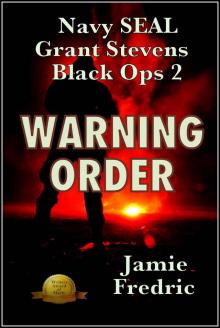 Warning Order
Warning Order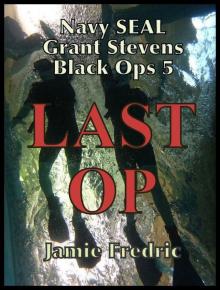 Last Op
Last Op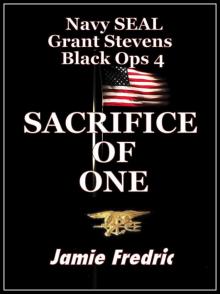 Sacrifice of One
Sacrifice of One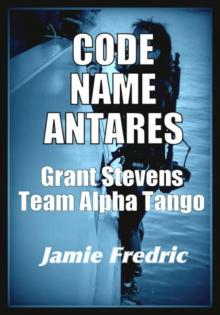 Code Name Antares
Code Name Antares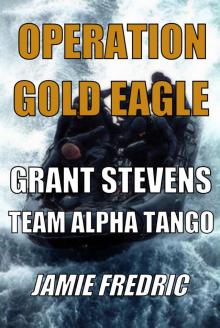 Operation Gold Eagle
Operation Gold Eagle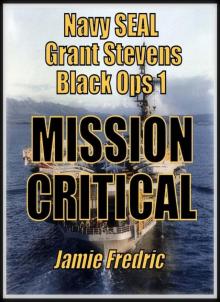 Mission Critical
Mission Critical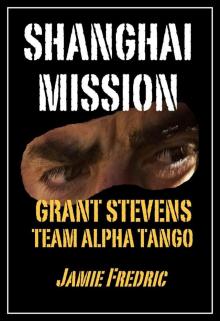 Shanghai Mission
Shanghai Mission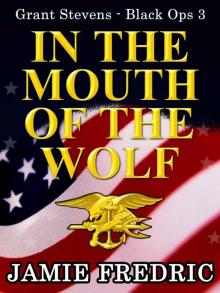 In the Mouth of the Wolf
In the Mouth of the Wolf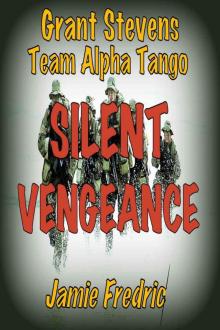 Silent Vengeance
Silent Vengeance